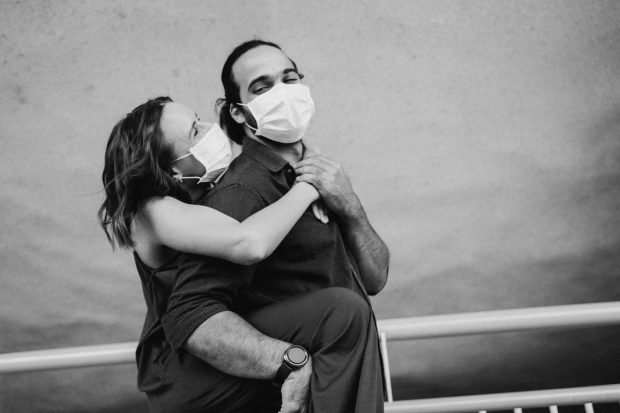In 2017, “cuffing season” was shortlisted by Collins dictionary for its word of the year, defined as “the period of autumn and winter, when single people are considered likely to seek settled relationships rather than engage in casual affairs”.
The word comes from “handcuffing” – the urge to handcuff yourself to another human being, to become attached, to get into a relationship. It’s a powerful phenomenon, cuffing season, and it affects even the commitment-resistant among us. Who wants to be alone at home in front of the telly, after all, when you could recruit someone with whom to share body heat? Who wants to go to bed lonely, with a hot water bottle for comfort? Who wants to brave it and venture out in the wind and the cold to the pub, on their own? In the olden days, people collected wood and food supplies to get them through the winter; now, we hunt and gather spooning partners for the important evolutionary purpose of Netflix and chill through the cold, dark months.
Cuffing is a real thing
A survey of 2000 people, conducted by Lovehoney, has just proven that cuffing is alive and well in the UK. According to the survey, a whopping 76% of people are more inclined to look for a long-term partner during the colder months. That’s interesting, when you consider how long rom-coms have spent making summer out to be the season for love – maybe the hot months are more for flings, whereas the cold inspires a little more commitment.

There’s a serious trend towards cold-weather slothfulness, too, which is of course conducive to snuggling – of both the innocent and the sexy variety. 61% percent of these people said that the best thing about autumn dating is staying in on cold, grey, stormy nights together…
And that’s why it’s so important to lock down a partner at the beginning of cuffing season – because then everyone couples up and snuggles down at home, making it harder to meet new people for the purposes of sex/cuddle/love/intimacy time.
When the weather gets colder…
Sexpert Annabelle Knight states ‘Cuffing season rolls around every year, always around the same time – when the clocks go back, the nights draw in and the weather outside gets colder. During this time people, usually, those who wouldn’t normally be looking to get into a relationship, find someone and commit to them. These relationships are usually short-term and come to an end once springtime rolls around the following year.’
Relationship psychologist Tamlyn Coetzee has a bit of cuffing advice: “As the temperatures drop, people tend to seek comfort indoors. During the colder months there’s more free time to start looking online, but it’s also important to keep your spirits up by getting out of the house. Take up a new hobby. Try something like a painting or a cooking class – creativity boosts your energy and is a magnet for like-minded singles.”
And if you’re not into organised fun like that, Tinder and Bumble are efficient ways to recruit a cuffing buddy, without having to leave the house. Once you’ve secured your cuffing season partner, you can go on all sorts of sweet autumnal dates.
The psychology behind our desires for a relationship in the winter
Registered BPS psychologist Lilly Sabir describes a pressure during this time of year to be in a relationship for the holidays, which is likely driven by social pressures.
It is well known from psychology and human behaviour that the different seasons can impact our moods.
‘The lack of sunlight, colder temperatures and the tendency to hibernate can lead us to want more human contact as we are not outside triggering our Vitamin D levels which can lead to a dip in our moods’, states Lilly.
As temperatures improve, the need for a partner naturally decreases. Lilly adds ‘we can feed our own hormonal serotonin and dopamine oxytocin levels by being out in the sun and meeting up with others, regulating our own moods better through external environmental stimuli’.
Things to keep in mind during cuffing season
1. Communication is key
Cuffing season can get messy when people aren’t on the same page. “Too often, Coetzee notes, “one person is more invested than the other, and then feelings end up getting hurt.” Be sure that both of you have aligned expectations and intentions around the relationship. If they say they’re only looking for something temporary or don’t want to commit, don’t assume you’ll eventually change their mind.

Photo by Anna Tarazevich from Pexels
2. Be discerning—don’t rush
“Try not to rush into a relationship if you notice an elevation of longing during the winter season,” she says. Remember you can always lean on friends and family, and do activities you enjoy, to help with some of that loneliness and boredom.
“Dating out of loneliness or boredom leads to unhealthy relationships,” she adds. Overall, be sure to figure out whether you really like the person, “or if you are longing for love and companionship during a season where we search to hibernate with someone.”
3. Know when to set boundaries
If you’re starting to get the sense that you’re caught up in a cuffing relationship, and you’re not on board with that, it’s on you to say so. “Pay attention to what’s actually happening in the relationship, and not what you want to happen,” Coetzee says, adding to hold that boundary yourself when necessary.
4. Check in with your cuffing season partner
Sexpert Annabelle Knight suggests checking in regularly with your cuffed other, just to make sure they’re still on the same page.
5. Be kind to yourself
The colder weather has us going out less, seeing less people and ultimately feeling more isolated and lonely, ‘Give yourself some grace on this, it is a challenging time of year for lots of people, so if a romance is what you need to get through it, that’s also fine’ comments Sex and relationships expert, Julia Kotziamani.
6. Enjoy it for what it is
Now, if the two of you are on the same page about this being a temporary thing, and you’re both OK with that, let it be and enjoy it for what it is.
Bottom line
Cuffing season is here, and it’s a real thing. Good luck, and happy snuggling.
Main Photo by Toa Heftiba on Unsplash
References
The survey data in this study was based on a survey of 2000 adults in the UK who have previously had sex, which took place in November 2021.
For the full article on cuffing season, see the full study here https://www.lovehoney.co.uk/



![women [longevity live]](https://longevitylive.com/wp-content/uploads/2020/01/photo-of-women-walking-down-the-street-1116984-100x100.jpg)










